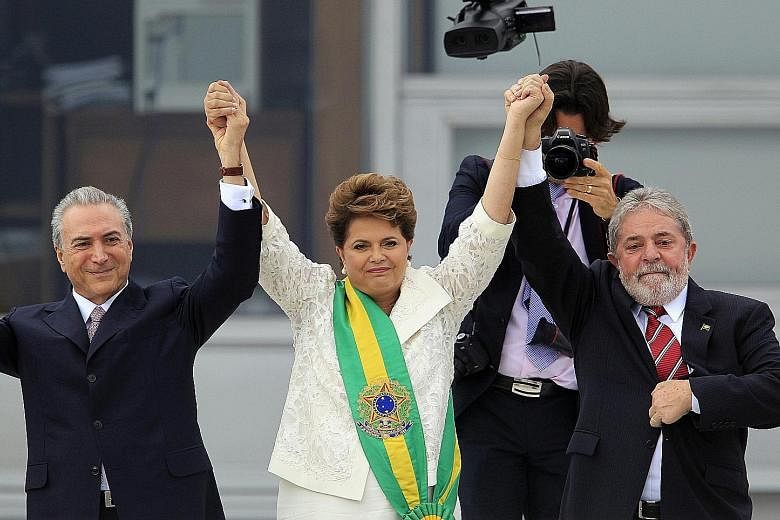BRASILIA • The removal of Brazilian President Dilma Rousseff from office ends an impeachment process that polarised Latin America's biggest country amid a massive corruption scandal and brutal economic crisis.
Senators voted 61-20 to convict the country's first female president for illegally using money from state banks to bankroll public spending, marking the end of 13 years of leftist Workers Party rule.
Ms Rousseff's opponents hailed her removal on Wednesday as paving the way for a change of fortunes for Brazil. Her conservative successor, Mr Michel Temer, the former vice-president who has run Brazil since her suspension in May, inherits a bitterly divided nation with voters in no mood for the austerity measures needed to heal public finances.
In his first televised address to the nation after being sworn in as President until 2018, Mr Temer called on Brazilians to unite behind him in working to rescue the economy from a fiscal crisis and over 11 per cent unemployment. "This moment is one of hope and recovery of confidence in Brazil. Uncertainty has ended," he said in the speech broadcast after his departure for a Group of 20 summit in China.
In an unexpected move, the Senate voted to allow Ms Rousseff to retain the right to hold public office - a break from Brazilian law that specifies a dismissed president should be barred from holding any government job for eight years. The move appeared to demonstrate unease among some senators, notably within Mr Temer's own fractious Brazilian Democratic Movement Party (PMDB), over whether a budgetary sleight of hand that is common in Brazil was truly an impeachable offence.
-
Others forced to exit
-
Brazil's former president Dilma Rousseff joins a gallery of leaders forced to either stand down through formal impeachment proceedings or resign under the threat of legal challenges.
INDONESIA: Mr Abdurrahman Wahid, accused of incompetence and corruption, was dismissed from the presidency on July 23, 2001.
VENEZUELA: President Carlos Andres Perez, accused of embezzlement and illegal enrichment, was suspended in May 1993 and his dismissal was confirmed by the Congress on Aug 31, 1993. Current President Nicolas Maduro is battling a proposed recall referendum to determine his fate.
ECUADOR: Mr Abdala Bucaram, accused of siphoning off public funds, was dismissed on Feb 6, 1997 for "physical and mental incapacity", six months after his inauguration as president. In April 2005, Mr Lucio Gutierrez was accused of packing the Supreme Court with associates in the midst of a popular uprising and also dismissed from the presidency.
PERU: Alberto Fujimori resigned from the presidency by fax from Tokyo on Nov 21, 2000, claiming Japanese nationality through his parents. Congress refused to accept the resignation and instead voted to sack and ban him from public office for 10 years. Extradited in 2007, he was jailed for 25 years for having ordered massacres of civilians and for graft.
LITHUANIA: On April 6, 2004, president Rolandas Paksas was ousted by impeachment after being charged with granting Lithuanian citizenship to a Russian businessman in exchange for money.
PARAGUAY: Mr Fernando Lugo was forced from the presidency on June 22, 2012 for dereliction of duty following his handling of a land dispute that left 17 people dead.
ISRAEL: Following a tax fraud and corruption scandal, president Ezer Weizman resigned in July 2000. In June 2007, president Moshe Katsav resigned as part of a plea bargain after being accused of rape and other sexual offences. In 2011, he was handed a seven-year prison term.
GERMANY: Mr Christian Wulff resigned from the federal presidency in February 2012 after being stripped of his immunity following an accusation of influence peddling. He was later cleared.
GUATEMALA: Otto Perez, accused of being part of a ring of officials who took bribes to allow firms to import goods without paying import taxes, was stripped of his presidential immunity by Parliament on Sept 1 last year. Facing impeachment, he stood down two days later.
AGENCE FRANCE-PRESSE
Until a few years ago, Brazil was booming economically and its status was rising on the global stage. The country then slid into its deepest recession in decades, and a graft scandal at state oil company Petrobras tarnished Ms Rousseff's coalition. Millions took to the streets this year to demand her removal, less than two years after she was re-elected.
A string of corruption scandals, led by the Petrobras scheme, has engulfed vast swathes of Brazil's political class and business elites over the past 21/2 years. Mr Temer will likely face tough opposition from the Workers Party, both on the streets and in Congress, to his agenda of privatisations, reforms to Brazil's pension and welfare laws, and a public spending ceiling that he hopes lawmakers will pass this year.
For the third straight day on Wednesday, pro-Rousseff demonstrators in Sao Paulo, Brazil's largest city, clashed with riot police, who used tear gas to clear the streets.
A defiant Ms Rousseff, a former leftist guerilla who was tortured and jailed under military dictatorship in 1970, insisted on her innocence and said her removal was a "parliamentary coup" backed by the economic elite that would roll back social programmes that lifted millions out of poverty over the last decade. "They think they have beaten us but they are mistaken," she said, adding she would appeal against the decision using every legal means.
The end of the Workers Party's long grip on power sparked angry reactions from leftist governments across the region. Venezuela, Bolivia and Ecuador withdrew their ambassadors, and Brazil responded by recalling its envoys for consultations.
Cuba's Communist government branded Ms Rousseff's ouster as part of an "imperialist" offensive against progressive governments in Latin America. The US State Department voiced confidence that strong bilateral relations with Brazil would continue.
REUTERS

